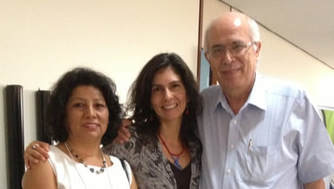|
In all the books and research papers on systems thinking that I have read, I don’t think I have yet found the word courage as part of the language used. There is a lot written about systems thinking in terms of it’s relevance and importance, it’s theories and methodologies, but nothing about what it takes–emotionally. And I’m convinced: systems thinking not only requires skill, it also takes courage.
I was invited as a keynote speaker to the 9th Brazilian Congress of Systems in Palmas, Brazil. My colleague, Raul Espejo, was the speaker who opened the conference. His presentation was about learning to act systemically. He ended his presentation with a poignant statement: “Systemic sensibility is an ethical imperative.” My presentation was the last event at the conference and I began with Espejo’s closing remark. I was happy that a recognized cybernetician like Espejo chose “sensibility” and not something else like systemic understanding (a cognitive capacity) or systemic modeling (a technical capacity), for instance. He said systemic sensibility. How perfect for me: That was the focus of my presentation– the need to move from systems thinking to systems feeling, being and doing. In one of the sessions, a researcher presented his work on the management of toxic agrochemicals using the Viable Systems Model as his methodology. Given that my Portuguese is basically non-existent, I understood very little, but enough to realize that the scope of the inquiry was very narrow. This became apparent in the Q&A session when the researcher said that as an employee of the Ministry of Agriculture he doesn’t have the power to question the use of pesticides and herbicides but only to regulate and control their use. My internal reaction was: What kind of excuse is that? He also said that he wants to feel good about his work and therefore doesn’t question the current practice of using toxic chemicals in agriculture. I was shocked. What kind of systems thinker restricts the scope of his work to the limitations imposed by reductionistic cultural practices? Two possible answers came to my mind: 1) a not-sufficiently-systemic thinker who misses the implications of his conformity to the status quo; or 2) a systems thinker who is too afraid to question the status quo. A true systems thinker will continually ask the difficult questions that expand the boundaries of the inquiry. But it takes courage to ask those big questions (usually beginning with why? and why not?) that take us to the root of a problem; where we usually find that we are an integral part of it and that change will involve changing ourselves. I wanted to ask him: Do you need clean air to breath? Do you love a child? Do you care about the health of people? What happened (or did not happen) in your education or life experience that got you disconnected from the pulse of life? How did you become more concerned about fitting into an unviable, unhealthy system than to be an agent for its transformation? When I notice that someone is acting within such self-imposed limitation; a failure to assume our common responsibilities and to own our power to change the course of human systems, something gets activated in me. I cannot remain neutral and ask curious unattached questions. I become “emotional.” It is this emotional connection that moves me, in a humble but persistent way, from being a passive observant to an active participant among initiates who know we can affect systemic change toward peace and sustainability. Whether it is through the experience of fear, despair, anger, joy, beauty, or love, I am moved to speak up on behalf of living systems and future generations. I do so because I care, because I know that what is at stake is much more than my egoic gratification, my sense of safety and comfort, or my desire to be accepted by a group who might find my words unconventional or threatening to their privilege. We hide behind walls that arbitrarily separate the disciplines and professions, and we justify our inaction by telling ourselves and others “that’s not my area.” We go around the ethical imperative to embrace a systemic sensibility, to be fully human, and to assume our role as leaders. We overlook the fact that our thinking, our actions, the way we relate to others, and the choices we make at home, at work, or as citizens affect not only our personal lives but also the possibilities for the future of this interconnected planet. However, the idea that everything is connected to everything is not an abstract concept. It is a very practical guide for how to live! There was no lack of passion in this conference. Oh no. Even though many of the presentations involved content that was highly theoretical or conceptual, the presenters clearly demonstrated that systems researchers are passionate about their work. This is good: it is a testament that these inquirers find their explorations meaningful. I wonder if this passion could be the energy needed to expand the boundaries of systems inquiry and find the courage to embrace the big questions raised by most encompassing systems. Let us ask the simple but fundamental questions: So what? Who cares? Is it good for people and planet? When the results of a study or project are treated as only relevant to a narrowly defined group of technicians, without considering whether it has some undesirable “side effect” for someone else, then there is a need for courage and a heart connection to the real needs of the world. Scientific specializations should become perspectives to support the transdisciplinary exploration of larger and more fundamental questions that are relevant to humanity as a whole and the viability of our global civilization. What kind of economic system, educational system, health care system, food production system, or political system works in accordance to life-sustaining principles? The answer is: The ones we need to design. We already have the knowledge and technology to create them. Now we need the courage.
0 Comments
Leave a Reply. |
AuthorKathia Castro Laszlo, Ph.D. Archives
September 2014
Categories
All
|


 RSS Feed
RSS Feed